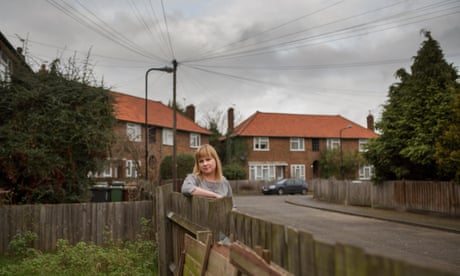
Writing in the Guardian online today Stella Creasy MP asks: "Who should pay the human cost of somewhere being labelled an up-and-coming place to live? It’s a question the residents of the Butterfields estate have been asking since eviction notices arrived in early February. This was the first they knew that their homes in highly desirable Walthamstow Village had been sold by their previous owners, the charity Glasspool, to a private developer.
That developer, Butterfields E17 Ltd, borrowed millions of pounds from NatWest to finance this deal. The plan was simple enough: exploit London’s property boom by selling on the properties as quickly and at as high a price as possible. The only thing standing in the way? Sixty-three tenants and their families living there.
This case tells you everything about the impact of gentrification now engulfing London and beyond, with speculative developers, callous banks and even a charity that should know better. Since it bought the estate, Butterfields E17 Ltd has sent bullying letters to the residents. Those interested in buying the estate as a going concern have received short shrift. That long-standing locals face homelessness and poverty means little to developers convinced they can make a quick buck at auction.
Glasspool, NatWest and Butterfields E17 Ltd all blame each other – and all wish the tenants would just go quietly
None of this could go ahead without its backers, NatWest. The bank has defended its lack of action on the basis that it only has a responsibility to its customer, not those being evicted. This is in stark contrast to its ethics policy which claims that NatWest tries not to make loans “which could damage the bank’s reputation”. Butterfields E17 Ltd would have had to declare its intentions to borrow the money, as well as to put the properties up for auction. Either NatWest didn’t bother to ask, or approved a loan knowing full well it required the eviction of these families to be repaid.
Just as NatWest seems to have sacrificed its integrity for a fast profit to be made, so too the charity which sold the estate needs to account for its conduct too. When I met Keith Nunn, chair of the trustees of Glasspool, I asked what obligations he thought he had to those who are going to be homeless – his response was that “it happens”.
These families aren’t being evicted because “it happens”. They’re being evicted because a charity that says it wants to help those affected by homelessness saw an easy financial windfall and so sold off its estate to a grasping development company. Glasspool say it sought assurances that this wouldn’t happen, but the money it was offered seems to have salved any consciences when these failed to materialise. That these properties are being resold at a higher value so soon after the charity sold them also raises questions about the management of such valuable assets by its trustees – we still await confirmation from the Charity Commission that it is investigating this.
It’s not too late for NatWest to do the right thing. The bank could use its status as a lender to Butterfields E17 Ltd to require the charity to negotiate with those who wish to buy the estate – including Dolphin Living, who rescued the New Era estate in similar circumstances – and keep the residents in their homes. The Charity Commission can challenge Glasspool’s refusal to take responsibility. As it has made approximately £16m, it seems only fair Glasspool compensates those who now face destitution as a direct result of their behaviour.
Under pressure, Glasspool, NatWest and Butterfields E17 Ltd all blame each other – and all wish the tenants would just go quietly. But the importance of this case goes well beyond the fate of an existing community in a property hotspot.
The lack of affordable housing for working people, as rents and prices are puffed up by such speculation, is hollowing out London. The taxpayer still owns 73% of this bank, so we will end up paying both to bail them out and to support the families made homeless by its customers. So too, bestowing benefits on organisations that act with such hypocrisy denigrates all who share its charitable status. If banks, businesses and even charities continue to pursue profit alone in our overheated property market, then it falls to the government to put people first before we are all gazumped.

No comments:
Post a Comment